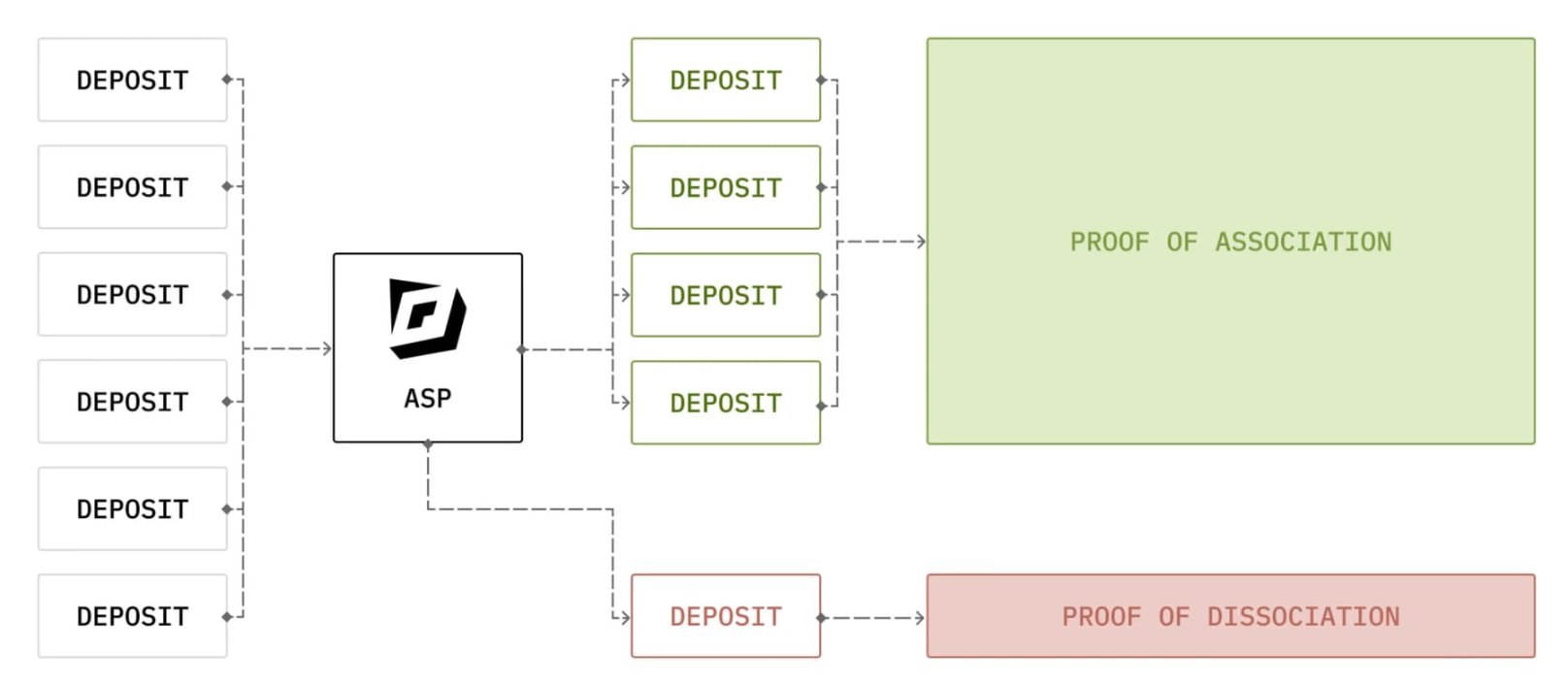Author: KarenZ, Foresight News
On April 1, the on-chain privacy infrastructure 0xbow announced the official launch of the Privacy Pools mainnet. Privacy Pools draws on research from Ethereum co-founder Vitalik Buterin and others, providing Ethereum users with a mixing solution that protects on-chain privacy while distinguishing legal funds from illegal ones.
This article will introduce the concept, origin, developer team, operational mechanism of Privacy Pools, and its potential impact on the industry.
What are Privacy Pools?
Privacy Pools is a new type of blockchain privacy tool designed to provide users with the ability to conduct anonymous transactions while ensuring the compliance of fund sources.
Unlike traditional mixing services (such as Tornado Cash), Privacy Pools utilizes Zero-Knowledge Proofs (ZKP) and the design of Association Set Providers (ASP) to protect user privacy while preventing illegal funds from mixing into the transaction pool.
This mechanism meets the privacy needs of ordinary users while addressing regulatory compliance requirements, providing a feasible path for the DeFi ecosystem that balances privacy and legality.
Who proposed Privacy Pools? Who released it?
The concept of Privacy Pools originated from a research paper co-authored in 2023 by Vitalik Buterin, Jacob Illum (Chief Scientist at Chainalysis), Matthias Nadler (Ph.D. candidate at the University of Basel), Fabian Schär (Professor at the University of Basel's Center for Innovative Finance), and Ameen Soleimani (Privacy Pools).
The paper explored how to achieve a balance between privacy and compliance on the blockchain, proposing a new privacy-enhancing protocol based on smart contracts called Privacy Pools, explaining how privacy pool technology can serve as a neutral infrastructure to ensure that public blockchains comply with regulatory requirements across jurisdictions.
The Privacy Pools protocol was released by the 0xbow team. 0xbow is a startup focused on blockchain privacy and compliance infrastructure. Key team members include:
- Co-founder Zak Cole: also a co-founder of the BTCFi project corn, managing partner at Number Group, and author of EIP-6968.
- Strategic advisor Ameen Soleimani: also a co-founder of Reflexer Finance and IranUnchained, previously worked at ConsenSys, Filter, and other companies.
Investors in the project include Number Group, Vitalik, BanklessVC, Public Works, and several angel investors.
After the launch of the Privacy Pools mainnet, both Vitalik and Ethereum core developer Tim Beiko deposited 1 ETH into the privacy pool to show their support.
How do Privacy Pools work?
The Privacy Pools architecture consists of a contract layer, a zero-knowledge layer, and an Association Set Provider (ASP) layer. The contract layer manages assets and states, the zero-knowledge layer ensures privacy, and the ASP layer provides compliance functions.
Specifically, using zero-knowledge proofs allows users to prove they belong to a group of approved depositors without revealing their complete transaction history.
The ASP acts as a compliance tool, approving deposits that meet predefined standards and verifying that all private withdrawals come only from approved deposits. The ASP consists of two parts:
Service Stack: A set of modular services that continuously monitor, record, and categorize on-chain activities, assessing user credibility based on their on-chain behavior.
On-Chain Instances: Including a Public Registry and a ZKP Verifier. The Public Registry stores and manages ASP data through smart contracts, achieving seamless integration with blockchain protocols; the ZKP Verifier is responsible for validating zero-knowledge proofs, ensuring that the transaction compliance verification process remains private.
The operation mechanism of the ASP involves continuously monitoring on-chain transactions and regularly updating the "association set." Users can generate zero-knowledge proofs (ZKP) to demonstrate that their transactions belong to the compliance set without disclosing specific transaction details. Developers can use the ASP to define rule-based access controls, filtering user eligibility (such as excluding users associated with illegal activities), thus achieving a balance between privacy and compliance.

Privacy Pools allow users to encrypt transactions through mixing protocols while still proving that their funds come from legitimate sources. The specific operational process is as follows:
- Connect wallet and create a dedicated wallet: Users connect to the Privacy Pools system through a compatible wallet and create a dedicated 0xbow wallet (this wallet is only used for the privacy pool).
- Deposit: Deposit ETH into the privacy pool. The initial version supports a maximum deposit limit of 1 ETH and a minimum of 0.1 ETH. After depositing funds, the 0xbow ASP will review the source of the funds; if these funds do not come from illegal activities, they will be accepted into the association set. Once the transaction is confirmed, the deposited funds become part of the anonymous set. Deposits will appear in the Privacy Pools smart contract.
- Withdrawal: Specify the fund receiving address. The dApp will automatically generate a zero-knowledge proof in the user's browser. After confirmation, the withdrawal transaction is completed, and the funds are transferred to the specified address.
It is worth noting that as the ASP continuously updates its rules, initially approved deposits may lose their eligibility. This means that even if users pass the initial screening, they may still be prohibited from withdrawing.
Conclusion
The launch of Privacy Pools provides users with tools that balance privacy and compliance, potentially encouraging more institutions and enterprises to adopt blockchain technology.
By isolating illegal funds, Privacy Pools help alleviate regulatory pressure on the industry, clearing obstacles for industry development to some extent. Additionally, other privacy protocols can integrate the ASP mechanism to enhance their compliance and promote the standardization of privacy technology. Of course, ordinary users can also participate in on-chain activities in a safer and more compliant manner, redefining the "norm" of blockchain privacy.
However, the path to success for Privacy Pools still faces many challenges, including the credibility of the ASP, the centralized review boundaries of the ASP, regulatory adaptability across different jurisdictions, and the attitudes of regulatory agencies.
References:
https://papers.ssrn.com/sol3/papers.cfm?abstract_id=4563364
https://docs.privacypools.com/
https://0xbow.io/blog/getting-started-with-privacy-pools
免责声明:本文章仅代表作者个人观点,不代表本平台的立场和观点。本文章仅供信息分享,不构成对任何人的任何投资建议。用户与作者之间的任何争议,与本平台无关。如网页中刊载的文章或图片涉及侵权,请提供相关的权利证明和身份证明发送邮件到support@aicoin.com,本平台相关工作人员将会进行核查。




